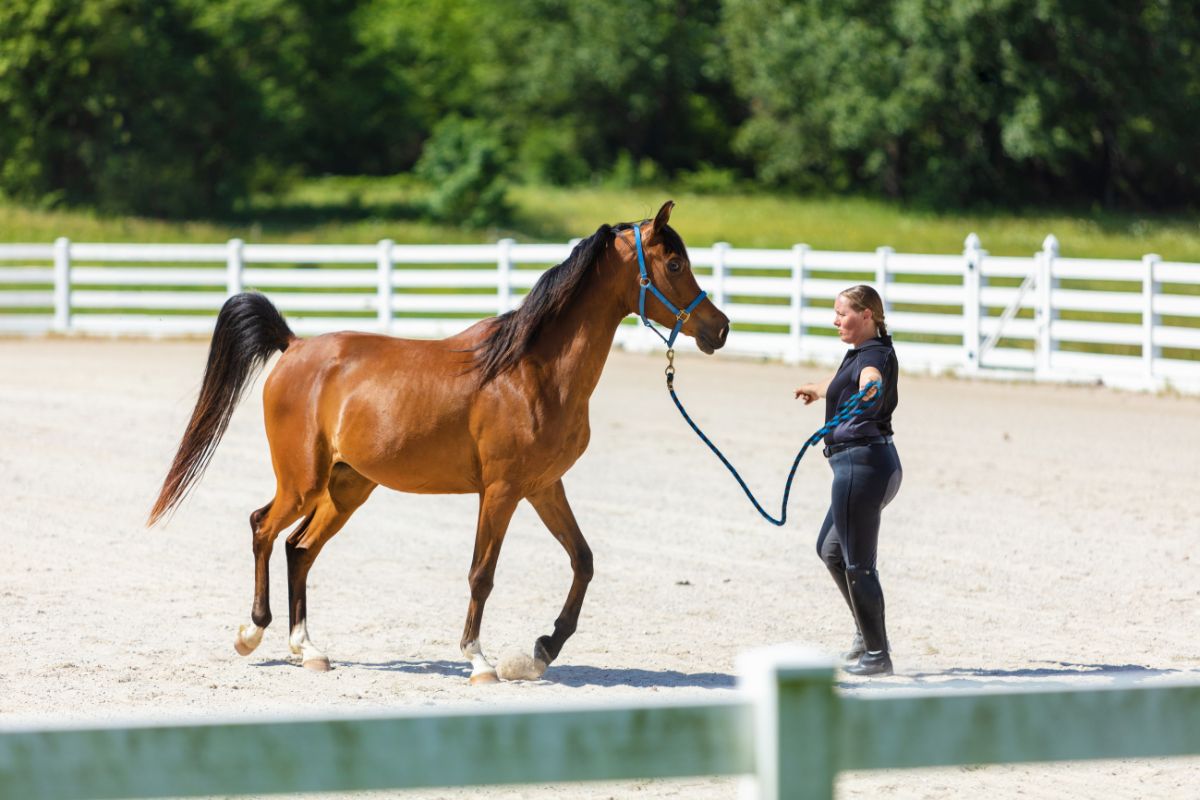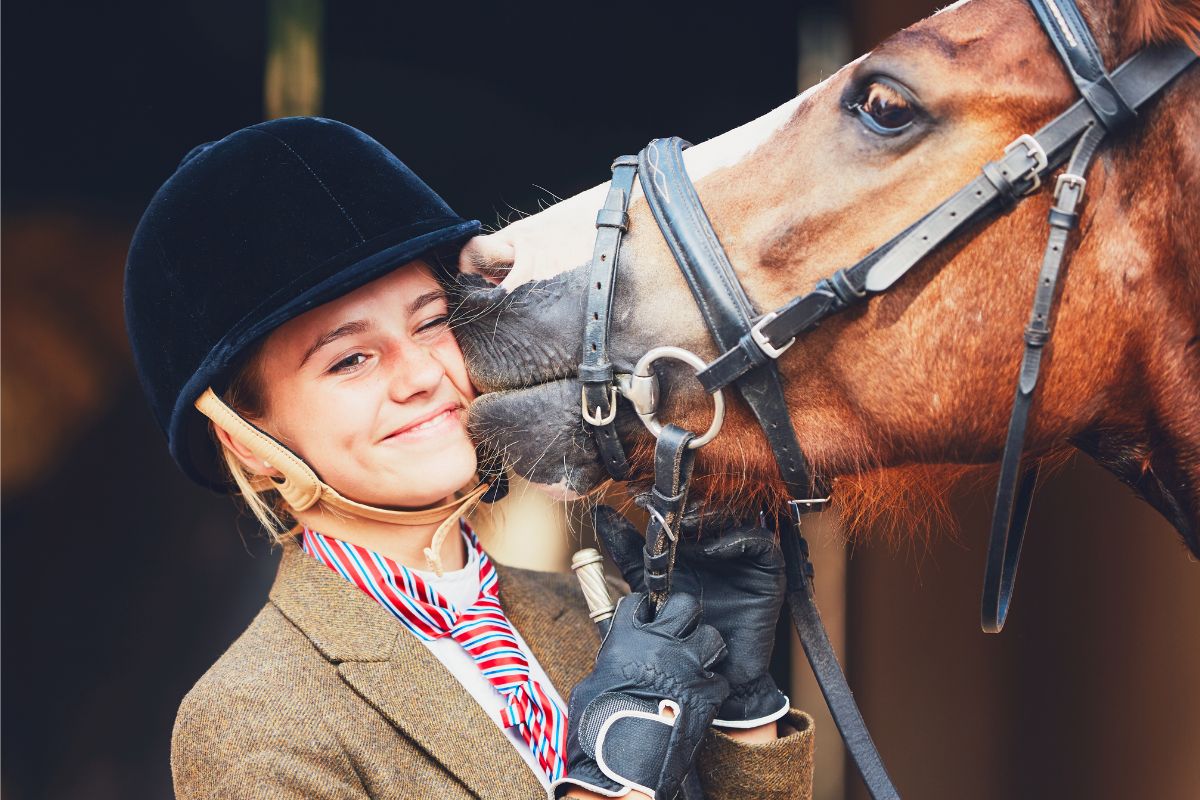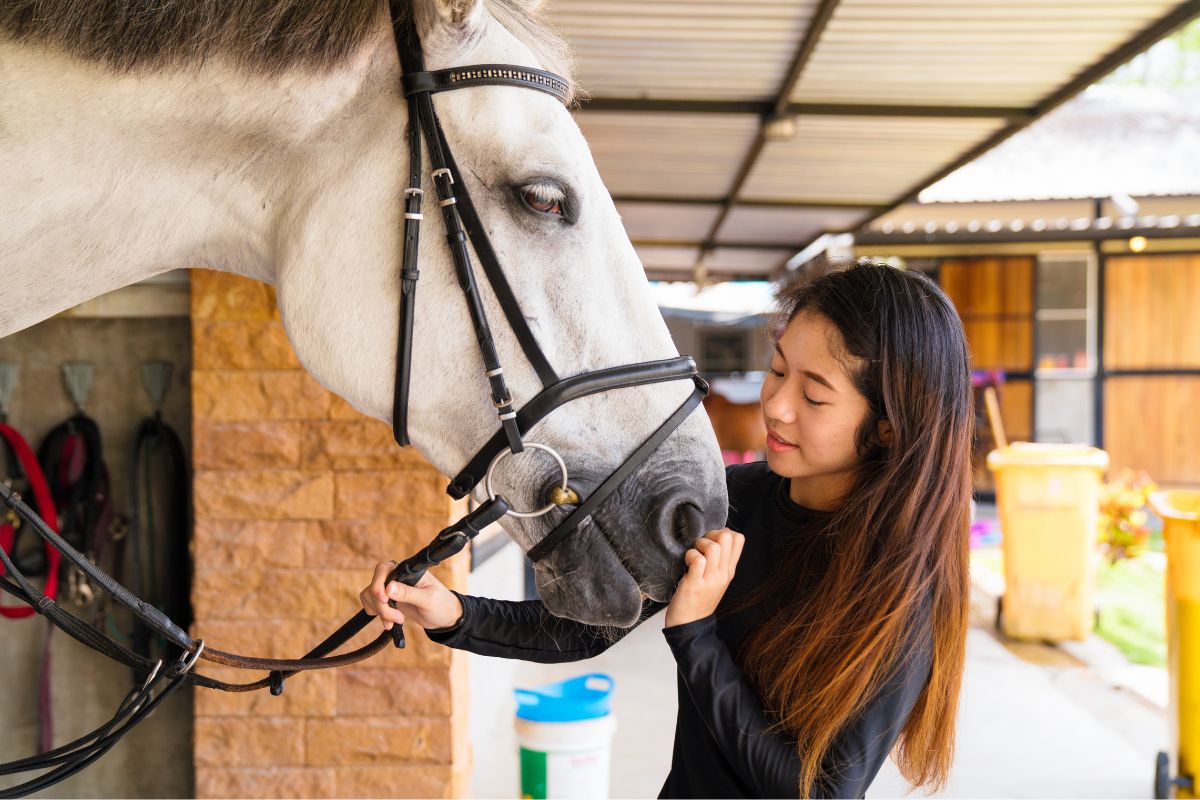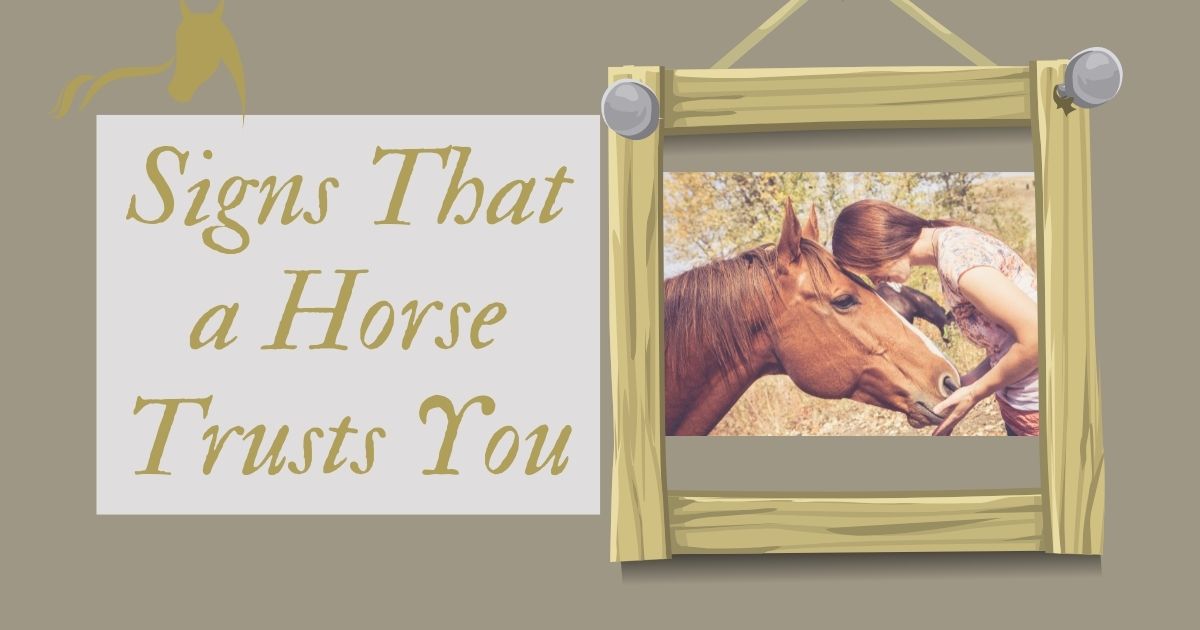Horse Body Language
As a horse owner, you need to know the signs that a horse trusts you. It’s easy to focus on a horse’s vocalizations when figuring out what it is saying because people rely so heavily on verbal communication. Like many other animals, horses communicate more through their postures, gestures, and attitudes than through their vocal cords.
You can distinguish great trainers by their ability to read and respond to the horse’s body language.

How to Tell if a Horse Likes you
As a horse owner, it is important to have skills on how to know if a horse likes you. Horses are gregarious animals who prefer to be in the company of others. They build strong attachments to their owners. Your horse will often exhibit affection for you after spending time with you. The following are signs a horse likes you;
It Approaches You
If a horse likes you, it will frequently approach to greet you when it hears you coming. It might sprint up to the pasture fence or stand at its stall door, waiting for you. When a horse jumps up to welcome you, it signifies that it likes you. It’s eager to spend time with you when it comes and greets you.
It Whines or Nickers for You
Horses frequently nicker and whine when they see someone they know. When they’re trying to catch the attention of other horses or people, they’ll often whine or nicker. When your horse nickers as you approach, it is happy to see you. Nickering is a means for it to acknowledge you as someone important to it.
It Places its Head on Your Shoulder
It’s a gesture of trust when a horse rests its head on your shoulder. It is at ease around you and trusts you enough to rest its head on your shoulder.
When a horse rests its head on you, it’s a method for it to display affection and bond with you. It is letting you know how much it likes being around you. It’s like it’s hugging you.
It Nudges You
Though nudging can refer to various things, it most commonly has a connection with a horse showing you affection. We can liken nudging to a horse hugging or kissing you. If a horse likes you, it will typically nudge you to pay attention to you. A horse can express love for you through gentle nudges. In addition to its nudge, it will also lick you.
It is at Ease Around You
It’s a sign that a horse likes and trusts you when it relaxes around you. While you see your horse feels calm when you’re around, it’s a sign that it trusts you. Licking and chewing, lowering its head, sighing, and cocking a rear leg are signs that your horse is comfortable with you.
In case your horse doesn’t like you, you should strive to get tips on how to get a horse to like you. This move will help you live comfortably with your horse.
Signs That a Horse Trusts you.
As a horseback rider, you wish to know whether or not your horse has faith in you. You may also wonder how to make a horse love you. Because having a horse that completely trusts you can help you win riding contests and avoid dangerous situations. These are the general signals to look for when determining whether or not a horse trusts you.
When They Follow Your Instructions
How your horse responds to your commands is one of the easiest ways to determine whether or not it trusts you.
When presented with an intimidating circumstance or a patch of abundant grass ready for the plucking, a horse who trusts your authority and leadership is significantly more likely to obey your commands.
When you ask it to do anything new, a horse who trusts you will have faith that you are not leading it into danger. While each horse has its eccentricities and things that make it uncomfortable or afraid initially, after it trusts you, you should have little trouble addressing these habits.
Desensitization training is an excellent approach to acclimate your horse to new conditions while teaching it to trust you. I have created a guide for you here with further information on desensitizing your horse.
When a Horse Comes to You
How your horse reacts when you go to fetch it is another clue of whether or not it trusts you. If your horse flees from you, it likely associates you with too much effort and insufficient reward. When this is the case, it would rather stay in its pasture or stall and feed in peace.
The answer to fixing this is to show it that it can rely on you to reward it for its hard work. While it is possible to encourage your horse to come to you by just showering it with sweets, I believe training your horse to come to you without you coaxing it with a treat is healthier and more fulfilling.
When They Respect You
Regarding horses, you can’t have one without the other. You’ll have a hard time earning its respect if you’re inconsistent in your training, don’t give clear directions, allow your horse to call all the shots, and never spend time simply enjoying your horse.
Horses in a field develop a natural pecking order over time, with one horse emerging as the leader. The horses confront one another while establishing this order and continue to do so even after choosing a leader.
As a horse owner, you must position yourself as the relationship’s leader to acquire your horse’s respect. You can accomplish this by being tough and forceful but also being gentle and compassionate and ready to congratulate your horse whenever it makes any improvement.
When a Horse Allows You to Touch It
If you are new to a horse, it may hesitate to allow you to touch it. This is especially true for horses that have never had much human connection.
If a horse doesn’t trust you, touching its neck, face, or ears will cause it the most dread and discomfort. However, be careful not to misinterpret unfavorable reactions to physical touch as a lack of trust when it is genuinely a medical condition.
Spending time with your horse and practicing groundwork will earn its respect, and it will become more comfortable with you touching it.
When Horses are at Ease Around You
The body language of a horse can reveal a lot about what’s going on within its head. When a horse trusts you, its body language should be comfortable. Here are some telltale indicators that a horse isn’t feeling well:
- Press its lower lip together.
- Its nose dilates.
- Its tail moves swiftly or may not move at all.
- It has its ears pinned back on its head, or it is attentive and looking at you.
Horses that are at ease in your presence will have a relaxed disposition. The more time you spend with horses, the easier it is to recognize when something is wrong with your horses.

How to Get a Horse to Trust you
Suppose you spot your horse displaying any of the above indicators of distrust; the next step is to adopt remedies to help your horse establish trust and confidence in you. Here are some of the most effective ways to allow you to acquire your horse’s trust:
Be a Good Leader
As previously stated, horses in a field automatically create a pecking order. One horse emerging as the leader and establishing yourself as the relationship’s leader is critical in your relationship with your horse.
When you ask your horse to perform something, you should be strict with it. If it does not reply appropriately or promptly, you should teach it that disobedience takes more effort than compliance.
On the other hand, you don’t want to use fear to dominate your horse by being too harsh with it. Make sure to reward and encourage your horse whenever it attempts to achieve anything you’ve asked.
Doing Groundwork
Groundwork is an important part of building your bond with your horse. If you want your horse to trust you in the saddle, you must first earn its trust on the ground.
By progressively introducing your horse to new problems, groundwork allows you to gradually push past any mental barriers your horse may have. It begins to realize that it can do what it wants confidently when it surpasses the hurdles without harming itself.
Rewarding Your Horse
Finally, continually recognizing your horse’s actions is a terrific method to earn their trust. Giving your horse a few treats after a hard workout, cleaning it, and spending time with it while it grazes are all ways to thank it.
Even if you don’t have an intensive training session with it, just being around it will help it begin to trust you more. When your horse wants to follow you around, you know you’re doing something right.
Signs of Submission in Horses
Horse owners want their horses to cooperate and respond to orders freely. When this is the case, horses appreciate when you ride them and will gladly accompany you on your ride. Submission, on the other hand, is a distinct kind of conformity.
When a horse is afraid, it will respond to commands. They will begin to dissociate and obey solely for evolutionary survival. Horses show the following indicators of surrender.
Despite Appearing Uncomfortable, They Comply
When a horse agrees to do anything, it should do so freely. If the horse language indicates that it is fearful and uneasy, its acquiescence is most certainly an indication of submission. It will move in a jerky, uncoordinated manner. Even though it is doing what you instruct it, the horse is afraid on the inside.
Not Obeying Further Commands
When a horse is in a condition of surrender, it can become laser-focused on the task. Even if you urge it to stop or do something different, it may keep doing it once it responds to instruction. This indicates that your horse has lost touch with reality and is in survival mode. This is distressing for the horse, and you should take time to soothe it.
Relaxed Body Muscles
When animals consent, all of their muscles relax. They recognize that they have little choice but to surrender to the will of their predator. In this case, their rider and their only chance of survival is to do so.
When a horse submits, its entire body relaxes. Eyes may close or roll up into their heads. The jaw is the only part of the body that will not relax. A combination of a clenched mouth and a relaxed body shows submission.
Loss of Equilibrium
Your horse may agree to a run, but it will not be a pleasant experience. Its knees could buckle under it if its muscles are in relaxation mode. The horse may become asleep and slump over. These abrupt, clumsy actions are dangerous to both you and the horse. You should try to calm the horse down and get it to lie down in a safe location. Read our article and find out 8 of the Best CALMING Supplements for Horses.
Acting Out Before and After Complying
A cooperative horse will continually comply. If it was struggling, fighting back, trying to run away, and suddenly obeying what you tell it, it’s because it is now submitting. You may act to prevent danger if you know the indicators of submission in horses. You need to take time to rebuild your horse’s trust and guarantee it will obey with joy and excitement.

Horse Trust Exercises
When it comes down to it, your horse needs to know that you will keep it safe and only ask it to perform things it can. You and your horse are partners, and mutual trust is the bedrock of your partnership.
This month, try some of the horse trust exercises and games below to improve your relationship with your horse:
- Stand your ground.
- Be a decision-maker.
- Touch its game.
- Make a figure-eight pattern.
- Pedestal challenge.
- Walking sideways.
Try some of these horse trust exercises and activities with your animal over this month to establish a more trustworthy relationship for the future. If you keep working on it together, you’ll be happy at how much of an influence it can make.

